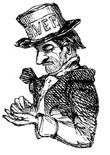
Ebenezer Scrooge at Christmas Today
"DECREASE THE SURPLUS POPULATION"
It could always be said of Ebenezer Scrooge that “he knew how to keep Christmas well if any man alive possessed the knowledge.”
Listen to a Christmas voice whose conversion from humbug-hurler to man of social conscience taught us presumably once and for all about the true meaning of the Christmas spirit.
Recall the scene in Dickens’s A Christmas Carol where those engaged in caring for the unwanted in Ebenezer Scrooge’s London are rebuffed by the miserable tightwad: “Let those poor go to the prisons and the Union workhouses,” is Scrooge’s reply to the plea for Christmas charity. “And if they would rather die, they had better do it, and decrease the surplus population.”
That Scrooge, wrote G.K. Chesterton in 1929, “utters all the sophistries by which the age of machinery has tried to turn the virtue of charity into a vice.” And presciently pointing to where we are today, Chesterton went on to say that hardhearted Ebenezer belonged “not only to the hard times of the beginning of the nineteenth century, but to the harder times of the beginning of the twentieth century, and the yet harder times in which we live. Many amiable sociologists will say as he said, ‘Let them die and decrease the population.’ The improved proposal is that they should die before they are born.”
You May Also Enjoy
Other inmates were shocked that pro-life rescuers got two to five years in prison for doing a sit-in, handing out brochures, livestreaming a sit-in, or planning a sit-in.
Why have no studies been done to investigate the long-term effects of vaccines? Why aren't pharmaceutical companies more closely monitored for their testing procedures?
To tamper with the generative function, as I did, is to make myself a god, or to tell God, in effect, “I know better than You do.”

